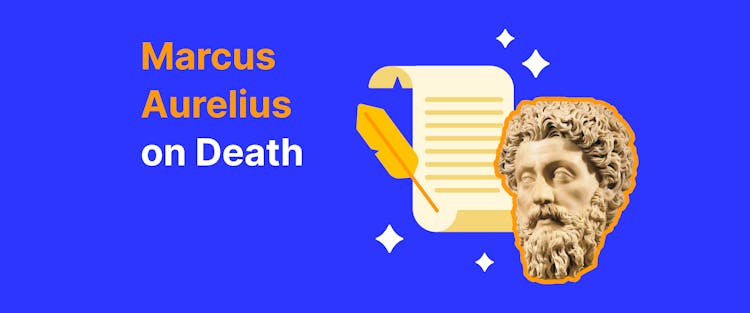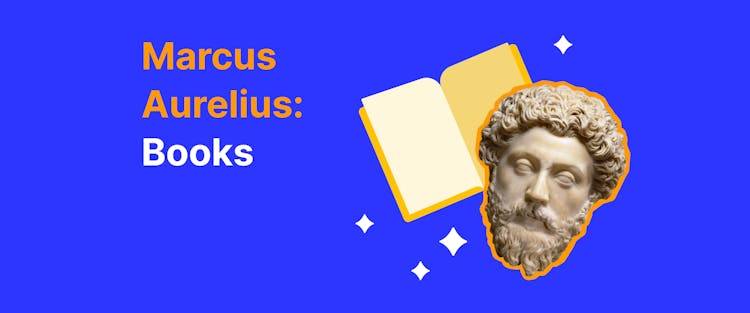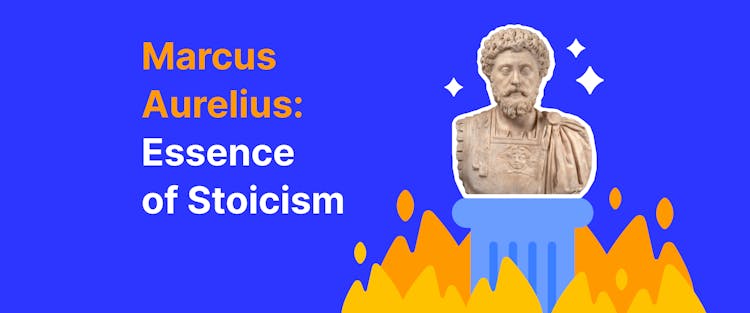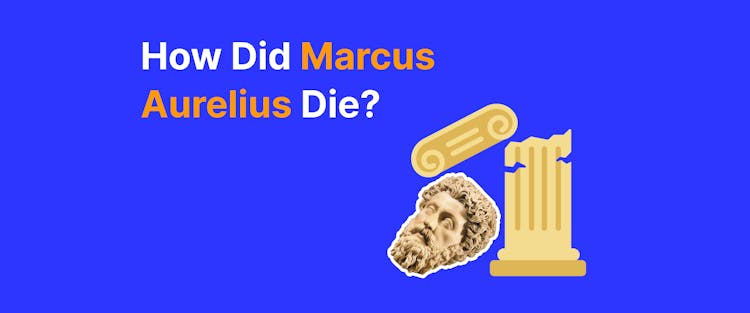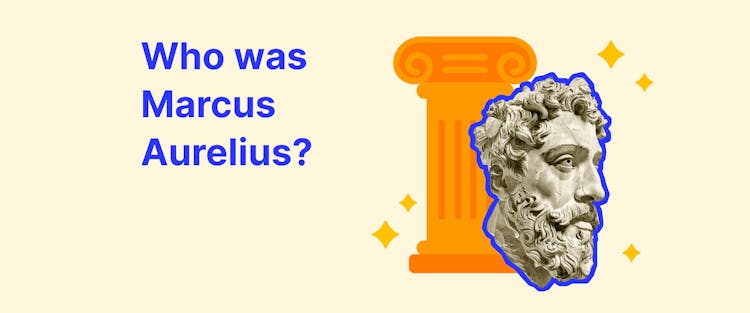In today's tumultuous world, where uncertainty looms large, the ancient philosophy of Stoicism has made a remarkable comeback. At its forefront is Marcus Aurelius, an emperor whose wisdom and resilience have captured the imagination of many.
Known for his practical approach to life's challenges, Marcus Aurelius isn't just a historical figure—he's a symbol of strength and inner peace. From leading Rome through tumultuous times to penning his renowned work "Meditations," Marcus Aurelius left an indelible mark on history. But how did he rise to such prominence? What was emperor Marcus Aurelius known for? Join us as we explore the life and legacy of this extraordinary leader and philosopher, as seen in his legendary diary, "Meditations."
Early life and rise to power
According to Historia Augusta, Marcus Aurelius belonged to the ancient Italian family of Annius Ver. He received a good home education. Apollonius of Chalcedon became his mentor in Stoic philosophy. Stoicism's religious and moral aspects made the strongest impression on Marcus Aurelius. The philosopher Lucius Junius Rusticus introduced Mark to the teachings of Epictetus and Seneca, whose views considerably influenced the young Marcus Aurelius. Marcus always consulted with Rusticus in public and private matters.
The future emperor studied Greek rhetoric from Herodotus Atticus. Marcus Cornelius Fronto, also his rhetoric teacher, had the most significant influence on the formation of Marcus Aurelius. In his time, Fronto was highly valued. He was even called "the second Cicero." An expert of Latin rhetoric realized himself as an excellent orator and noted that noble thoughts were the central and essential part of the oratory art, the lack of which cannot be compensated by any verbal skill or the presence of artistic taste. He instilled the understanding that tyranny was evil, gave rise to slander and hypocrisy, and that a heartless and callous soul distinguished people of aristocratic origin. The relationship between the student and the teacher was detailed in Letters to Fronto.
Relation of the Emperor Hadrian
Emperor Hadrian, who happened to be his distant relative, was Marcus' patron since childhood. From an early age, Marcus carried out various assignments given to him by Emperor Hadrian. At age 6, he received the title of knight from Emperor Hadrian, an exceptional event. At the age of 8, he was a member of the collegium of god Mars' priests, and from the age of 15-16, he was the manager of banquets arranged by Hadrian throughout Rome, and everywhere Aurelius showed himself from the best side.
The emperor Hadrian even wanted to appoint Marcus as his direct heir, but this was impossible due to Marcus' young age. However, the emperor adopted Antoninus Pius on the condition that Pius would adopt Marcus Annius Verus and Lucius Verus. Thus, he seemed to prepare Marcus in advance as Antoninus' heir. At 19, Marcus Aurelius became consul and was re-elected three times. He was a brilliant orator, dialectician, and connoisseur of civil law and jurisprudence.
Aurelius' spouse
The wife - Annia Galeria Faustina (or Faustina the Younger) - was the daughter of the emperor Antoninus Pius. The daughter of Antoninus Pius, whom he loved very much, was only 14 when they married in 145. After her husband Marcus became emperor in 161, Faustina constantly interfered in state affairs and tried to influence the emperor. At the same time, Faustina quite often accompanied her husband on trips. She participated in the German campaign of Marcus Aurelius, for which she received the title Mater Castrorum (Mother of the Camp).

Two emperors on the throne
During the last consular term in 161, Aurelius’ adoptive father, Antonius Pius, died. After taking power, Marcus Aurelius immediately appointed his co-emperor Lucius Verus with the titles of Augustus and Caesar, and from that time, they jointly ruled the state. Many dissuaded Marcus Aurelius from joint rule because of the foul temper of his adoptive brother, but justice was more important to him. The brothers ruled the country together for eight years. Lucius Verus became the husband of Marcus Aurelius' daughter Lucilla. Lucius died in 169, possibly of the plague, after the end of the war with Parthia. Power was transferred entirely to the sole emperor, Marcus Aurelius.
Philosophical contributions
The meditations of Marcus Aurelius are known worldwide under the general name "To myself" (Ancient Greek Εἰς ἑαυτόν). In Latin, it was Mediatationes, or as we know it in English, "Meditations." The work has 12 books written in ancient Greek as a diary in the 70s of the 2nd century, mainly during the wars with the Germanic tribes. Marcus was an Epictetus student; therefore, he learned not to grumble, tried to be hardy in numerous military campaigns, and calmly, like a true Stoic, withstood the blows of fate.
The Stoic philosopher Marcus Aurelius carried the ideas he believed throughout his life. Imperial life did not hinder high reasoning and only tested the persistence of the beliefs he followed.
About death
The river of life and death is the same stream. Marcus believed that one can understand the meaning of being through awareness of the reality of death, its naturalness, and readiness for it. In "Meditations" he wrote:
"Think not disdainfully of death, but look on it with favor; for even death is one of the things that Nature wills."

About wealth
According to Marcus Aurelius, calmly accept prosperity or wealth and always be ready to let it leave you. He practiced simplicity of being, renouncing luxuries, and was ready to sell his family’s jewels for the sake of the state.
"The ruling power within, when it is in its natural state, is so related to outer circumstances that it easily changes to accord with what can be done and what is given it to do."

Peace of mind
The Stoic teachers taught Marcus Aurelius an incredibly high discipline of mind and emotions. Philosopher King wrote about complete peace of mind when absolute balance was achieved inside and outside with the surrounding world:
"Not to display anger or other emotions. To be free of passion and yet full of love." (Hays translation)

Internal harmony, coherence of the whole and its parts, and unity with the entire world are ideal for a Stoic. Aurelius believed in the transience of life and showed his active position in life. From early childhood, Marcus learned new things. Then, he embodied social ideas for the betterment of society, defended the country, and constantly participated in military campaigns without fear.
"There is a limit to the time assigned you, and if you don't use it to free yourself it will be gone and never return." (Hays translation)

Virtuous life
The highest goal for a Stoic is to live a virtuous life, that is, by the laws of nature. Marcus Aurelius accepted and loved his fate. Amor fati (love of fate) is one of the most famous concepts of Stoicism. Freedom of choice allows a person to refuse to accept fate, to rebel against the general order, and to act or think contrary to common reason and nature.
"Yes, you can - if you do everything as if it were the last thing you were doing in your life, and stop being aimless, stop letting your emotions override what your mind tells you, stop being hypocritical, self-centered, irritable." (Hays translation)

His attitude to Christianity
Stoic philosophy, in the form in which Marcus assimilated it, and Christianity could easily conflict. Marcus Aurelius was an enemy of all metaphysics; he did not recognize as legitimate the desire of a person to solve problems that had no direct application to life. Meanwhile, every Christian, even the simplest, was busy with such metaphysical questions because every Christian was looking for a solution to eternal problems.
Christian teaching was also unacceptable for Marcus Aurelius' Stoic worldview. The central truth of Christianity - redemption - was utterly foreign to the thought of Marcus Aurelius. He taught that people had to look for help in all cases only inside themselves, in their strength. This was a direct denial of the Christian teaching about the redemption of humanity by external divine power.
Marcus Aurelius was a Stoic philosopher, and the persecution of Christians initially appeared to be a strange combination. But actually, the persecution of Christians took place by the name of the imperial order. The apologist Meliton of Sardis testified to issuing new decrees against Christians under Marcus Aurelius.
Military campaigns and achievements
The rule of Marcus Aurelius Antoninus Augustus and Lucius Verus was marked by brutal wars of the Roman empire with external enemies (Marcomanni and Quadi), the Antonine plague, and natural disasters.
162 AD
Immediately after suppressing the rebellion in Britain, Marcus Aurelius was forced to start a challenging and exhausting war with the Parthian state shortly after being proclaimed emperor. Its energetic king, Vologases III, sent his troops to Armenia and subjugated it to himself. The attempt of the Roman governor of Cappadocia to oust the Parthians from Armenia ended in defeat. Developing success, Vologases III crossed the Euphrates and captured part of Syria - a key province of Roman possessions in the East.
166 AD
All the tribes from Illyricum to Gaul united against the Rome. The situation was becoming threatening for the entire system of Roman power. Part of the Rhine and Danube legions had to be thrown to the Eastern army's aid, forcing the North's borders to weaken. The co-ruler of Marcus Aurelius - Lucius Verus, was placed at the head of a solid military group, and the best generals of the empire, Avidius Cassius and Statius Priscus, were his assistants. The Parthians were pushed out of Syria and Armenia. Roman troops occupied part of Mesopotamia.
However, the Romans failed to gain a foothold in Mesopotamia; the population did not support them, and a civil war began. Despite these setbacks, the Romans gained a foothold in Armenia and concluded a fairly profitable peace treaty with Parthia, according to which Northern Mesopotamia was ceded to the empire.
166-167 AD
The Marcomanni invaded the provinces of Pannonia, Noricum, and Rhaetia and reached Northern Italy through the Alpine passes: their detachments approached Aquileia. Danger could threaten Central Italy and even Rome. Preparations for the fight against the barbarians continued in a very unfavorable environment—the plague, the expenses of the Parthian campaign, and the state treasury devastated by the expenses of the Parthian war.
168 AD
Marcus Aurelius led a campaign against the Marcomanni tribes. Having spent all his treasure on this war, he arranged in Trajan's forum an auction of the luxuries belonging to the emperor: he sold gold and crystal goblets, imperial dishes, his wife's silk and gilded clothes, even precious stones, which he found in abundance in Hadrian's secret treasury. This sale lasted two months and brought so much gold that Marcus Aurelius could successfully continue the fight, win many victories, and reward the soldiers. The emperor defeated the rebellious Parthians in the East and recaptured the German tribes in the North.
To protect the empire's borders on the Middle Danube, Marcus Aurelius began developing a plan to create the Roman provinces of Marcomania and Sarmatia on modern Moravia and Eastern Hungary territory. However, this plan was not possible. The emperor was forced to leave the Danube region and go east urgently to suppress the rebellion in Syria.
175 AD
The local legions proclaimed the governor of the province and the famous general Avidius Cassius as emperor, supported by the aristocrats of the eastern provinces and Egypt who opposed the Roman government. The rebellion was suppressed even before the emperor threw into battle several legions from the metropolis and the border with the Germanic tribes. The Syrian legionnaires brought the severed head of Avidius Cassius to the emperor.
177 AD
Meanwhile, the Germanic tribes took advantage of the emperor's absence and renewed their attacks on the empire's northern borders. The emperor went to war again in the Second Marcomannic War. This campaign was quite successful. The barbarian attacks were repelled, and the situation on the border stabilized.
Administrative major accomplishments
The young Roman emperor was merciful and peaceful. His main task was to continue the successful undertakings of four previous rulers from the Antonine dynasty. He became one of the «five good emperors» (Nerva, Trajan, Hadrian, and Antoninus Pius) who went down in history as the last emperor of Pax Romana (time of peace).
Equal law for all
According to Marcus Aurelius, the political system of the Roman state should be perfect, similar to the order in a large city; for this, the ruler should be a morally perfect person. In the state, as in the world, there can be order and chaos. From a moral point of view, the emperor also looks at the social hierarchy issue, which a perfect ruler should head; the "aristocracy of spirit" should rule in the state. The middle class is on the path of moral improvement, and the lowest rung in the hierarchy is the crowd (people).
Marcus Aurelius' significant accomplishments were balanced policy and rule characterized by respect for the people, the Senate, and its members. He also created a state with equal law for all governed by equality.
Following his predecessors, Marcus Aurelius understood the need to support the urban population in need by distributing gifts of money, grain, and products from state warehouses. Not counting small distributions, during the 20 years of his reign, he arranged large distributions seven times, totaling about 850 denarii per person. These subsidies cannot be called very generous, but they helped keep the Roman people's peace and loyalty to the ruling emperor and his policies.
Social politics
Just as under the predecessors of Marcus Aurelius, the institution of supporting orphans and children of low-income parents was preserved through the financing of so-called alimony institutions.
Emperor of Rome Marcus Aurelius mortgaged and sold almost all his possessions and was unwilling to raise taxes to cover military expenditures. When the plague pandemic entered ancient Rome, the emperor ordered the burial of needy people at the state's expense.
Respect of Senate
Aware of the importance of philosophy, the emperor established four philosophical departments in Athens: the academic, peripatetic, stoic, and epicurean. He respected the Senate of Rome and ancient law and tried to improve it.
Marcus Aurelius respected legislators as much as Antoninus Pius. The emperor attached particular importance to introducing the most wealthy and authoritative aristocrats - natives of the provinces - into the Senate. During his reign, the Senate was filled with more provincials than under any of the former princeps, and the number of provincials of Eastern (Asian) and African origin increased significantly. The reign of Marcus Aurelius became known as the "Senate Renaissance," and the emperor openly declared his subordination to the Senate.

Legacy and modern relevance
Marcus Aurelius' legacy is not just rooted in the annals of history, but deeply interwoven with the fabric of modern life. His accomplishments, both as a Roman Emperor and a Stoic philosopher, offer us a blueprint for navigating the complexities of our own times with wisdom and equanimity.
Aurelius's meditations, a collection of personal reflections, serve as a testament to his introspective nature and commitment to virtue. These writings, penned amidst the demands of leadership and the chaos of war, remind us of the power of resilience, the importance of self-awareness, and the value of staying true to one's principles.
In today's fast-paced world, where uncertainty often prevails and external success is frequently prioritized over inner peace, Aurelius's teachings encourage us to pause, reflect, and realign our priorities. His life exemplifies the possibility of achieving greatness while maintaining humility, integrity, and a deep sense of responsibility to oneself and others.
Explore "Meditations" book summary with Headway
Exploring Marcus Aurelius's profound legacy leaves us wanting more. If you're intrigued and eager to learn more about his Stoic wisdom, the Headway app offers a concise summary of "Meditations" that's perfect for modern readers.
The journey through "Meditations" is not just a glimpse into the mind of a Roman emperor but a transformative experience that prompts introspection and self-discovery. Let Marcus Aurelius' words resonate within you, guiding you toward a life of clarity, virtue, and inner peace. There is a unique platform, the Headway app, that will help you use your precious time to develop and expand your horizons. After considering the achievements of the great Marcus Aurelius, the best solution would be to listen to the summary of his "Meditations."
Frequently Asked Questions
When did Marcus Aurelius rule?
Marcus Aurelius, Annius Verus Antoninus, was a Roman emperor from the Antonine dynasty who ruled from 161 to 180 CE. He was one of the famous five great Caesars of the Roman Empire.
What were Marcus Aurelius' biggest accomplishments?
Marcus Aurelius was the author of "Meditations," the most essential work of late Stoicism. He demonstrated military skill, resilience, and strategic insight, successfully repulsing invaders and reinstating stability in the empire's frontier territories. He enacted legal reforms to safeguard individual rights and curb corruption, advocated for education, and established educational institutions.
What did Marcus Aurelius do?
Marcus Aurelius Antoninus (121-180) entered world history as an outstanding Roman emperor and a Stoic philosopher. He waged defensive wars against the Germanic tribes in Gaul and above the Danube. Thanks to the philosophical diary "Meditations," Marcus Aurelius received the title of philosopher. As a ruler, he embodied moderate politics with its highest perfection.
How long did Marcus Aurelius rule?
Marcus Aurelius, Annius Verus Antoninus, was a Roman emperor from the Antonine dynasty who ruled from 161 to 180 CE.
Why is the statue of Marcus Aurelius considered a political piece of art?
Although the emperor was victorious, the statue of Marcus Aurelius was depicted without armor or weapons. He was wearing a soldier's cloak over a tunic. The gesture of the philosopher emperor's right hand was not threatening but a greeting and an offer of peace. In ancient Rome, equestrian statues were official devices to honor the emperor for military and civil achievement.
What did Marcus Aurelius accomplish?
Marcus Aurelius fought defensive wars against the Germanic tribes in Gaul and north of the Danube River. He also faced conflicts with the Parthian kingdom in the eastern regions. He adhered to the teachings of the Stoics, both in his private life and in governing the state. According to this philosophy, Caesar had to conscientiously fulfill his duties and devote himself entirely to the welfare of the state and his subjects.





